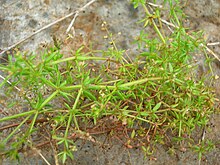Galium divaricatum
| Lamarck's bedstraw | |
|---|---|

| |
| Scientific classification | |
| Kingdom: | Plantae |
| Clade: | Tracheophytes |
| Clade: | Angiosperms |
| Clade: | Eudicots |
| Clade: | Asterids |
| Order: | Gentianales |
| Family: | Rubiaceae |
| Genus: | Galium |
| Species: | G. divaricatum
|
| Binomial name | |
| Galium divaricatum | |
| Synonyms | |
|
Galium anglicum | |
Galium divaricatum is a species of flowering plant in the coffee family known by the common name Lamarck's bedstraw.
Distribution
The plant is native to the Mediterranean Basin and the Black Sea region, from Portugal and Morocco to Turkey and Crimea; as well as the Macaronesia archipelago of the eastern Atlantic Ocean, on the Azores, Canary Islands, and Madeira.
It has naturalized in Belgium, Switzerland, Australia, New Zealand, Hawaii and scattered locations in the mainland United States.[1][2][3]
Description
Galium divaricatumis a small annual herb with thin spreading stems up to 30 centimeters long. The small, pointed leaves are arranged in whorls of up to eight about the stem.
It bears white flowers. The fruit is a hairless nutlet.[4][5][6][7]
References
- ^ Kew World Checklist of Selected Plant Families Galium divaricatum
- ^ Biota of North America Program Galium divaricatum
- ^ Altervista Flora Italiana, Galium divaricatum
- ^ Jepson Manual Treatment
- ^ Lamarck, Jean Baptiste Antoine Pierre de Monnet de. 1788. Encyclopédie Méthodique, Botanique 2(2): 580–581
- ^ Zuloaga, F. O., O. N. Morrone, M. J. Belgrano, C. Marticorena & E. Marchesi. (eds.) 2008. Catálogo de las plantas vasculares del Cono Sur. Monographs in systematic botany from the Missouri Botanical Garden 107(1–3): i–xcvi, 1–3348.
- ^ Hickman, J. C. 1993. The Jepson Manual: Higher Plants of California 1–1400. University of California Press, Berkeley.
External links
- Photo of specimen at Missouri Botanical Garden, collected in Missouri, Galium divaricatum
- USDA Plants Profile
- Photo gallery
- Tela Botanica, Galium divaricatum
- Galium
- Flora of Algeria
- Flora of Croatia
- Flora of Greece
- Flora of France
- Flora of Italy
- Flora of Morocco
- Flora of Spain
- Flora of Portugal
- Flora of Romania
- Flora of Serbia
- Flora of Turkey
- Flora of Madeira
- Flora of the Canary Islands
- Flora of the Azores
- Plants described in 1788
- Taxa named by Jean-Baptiste Lamarck
- Rubiaceae stubs
